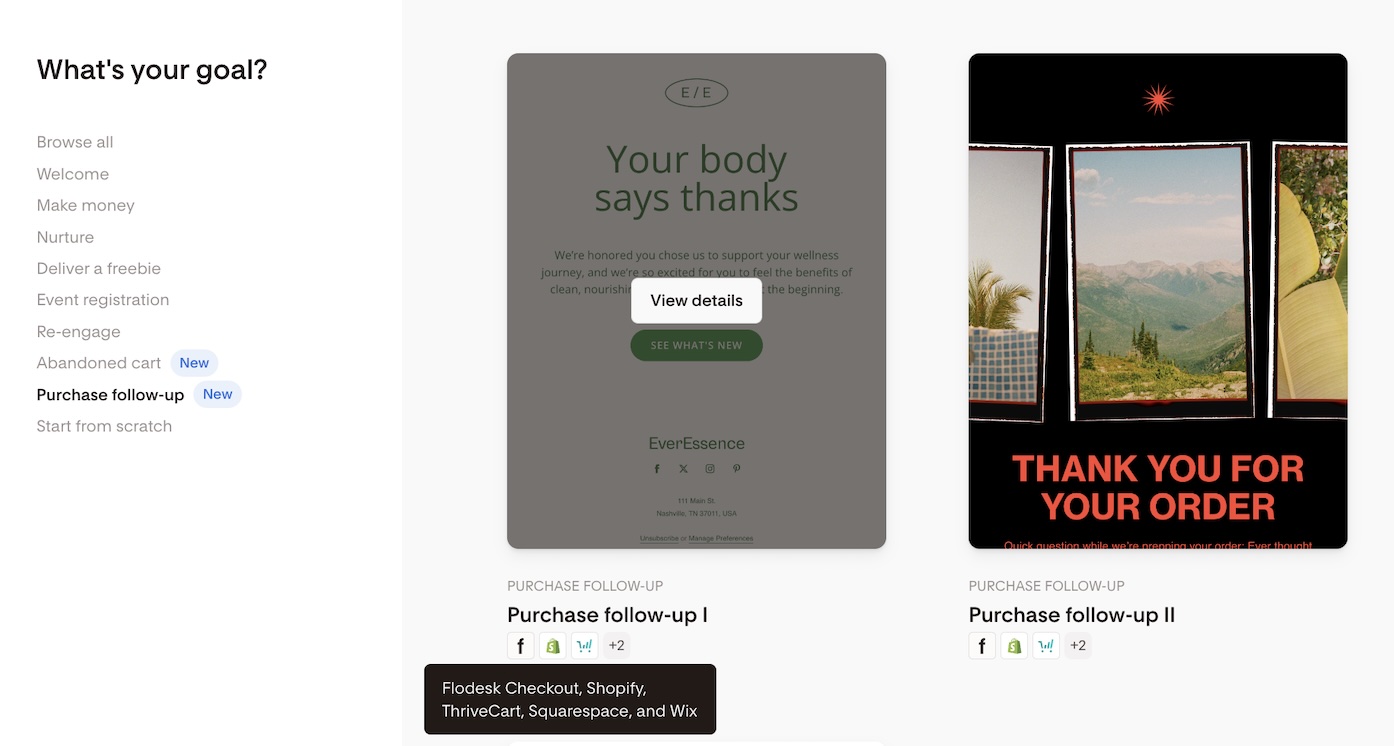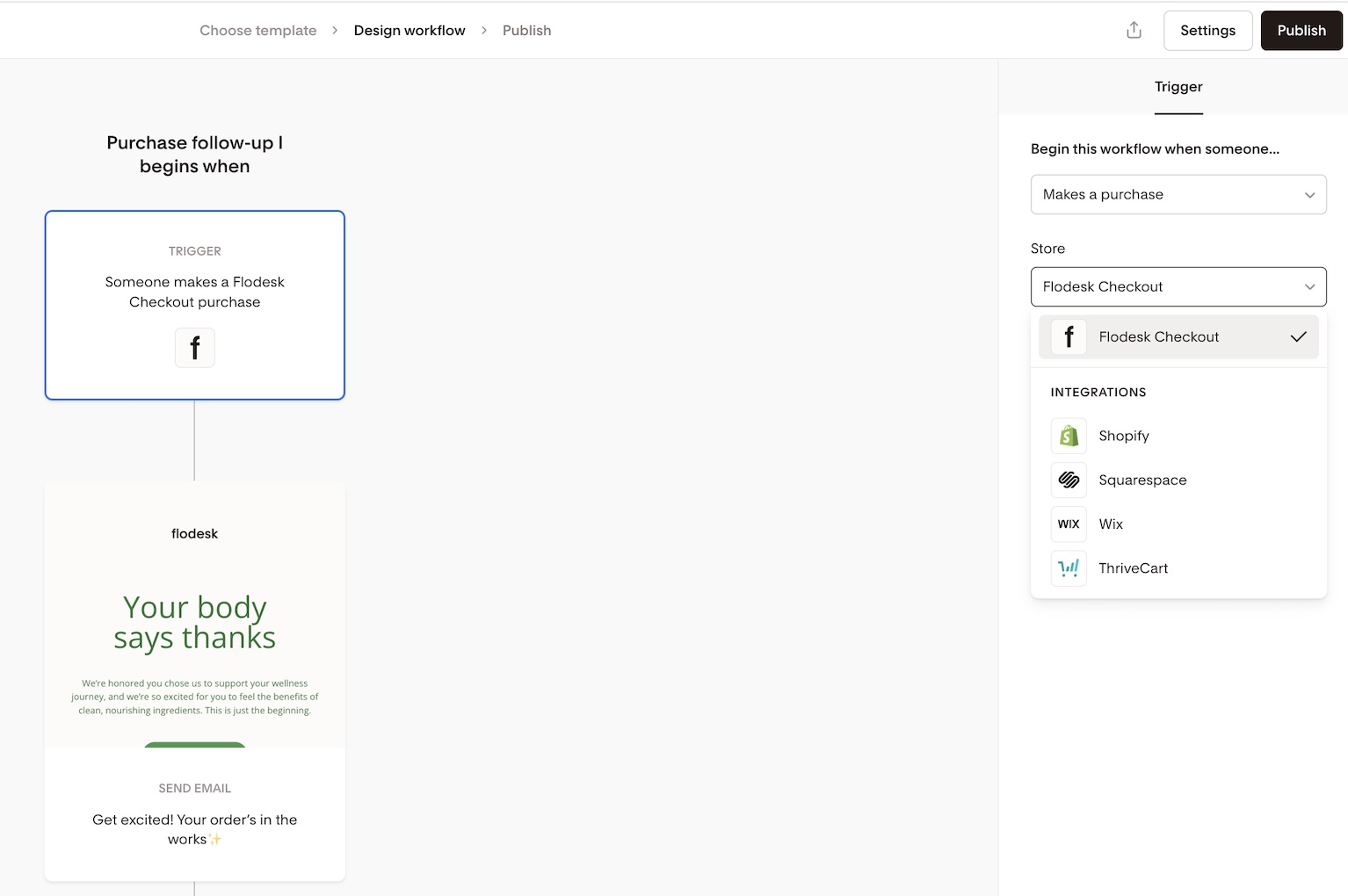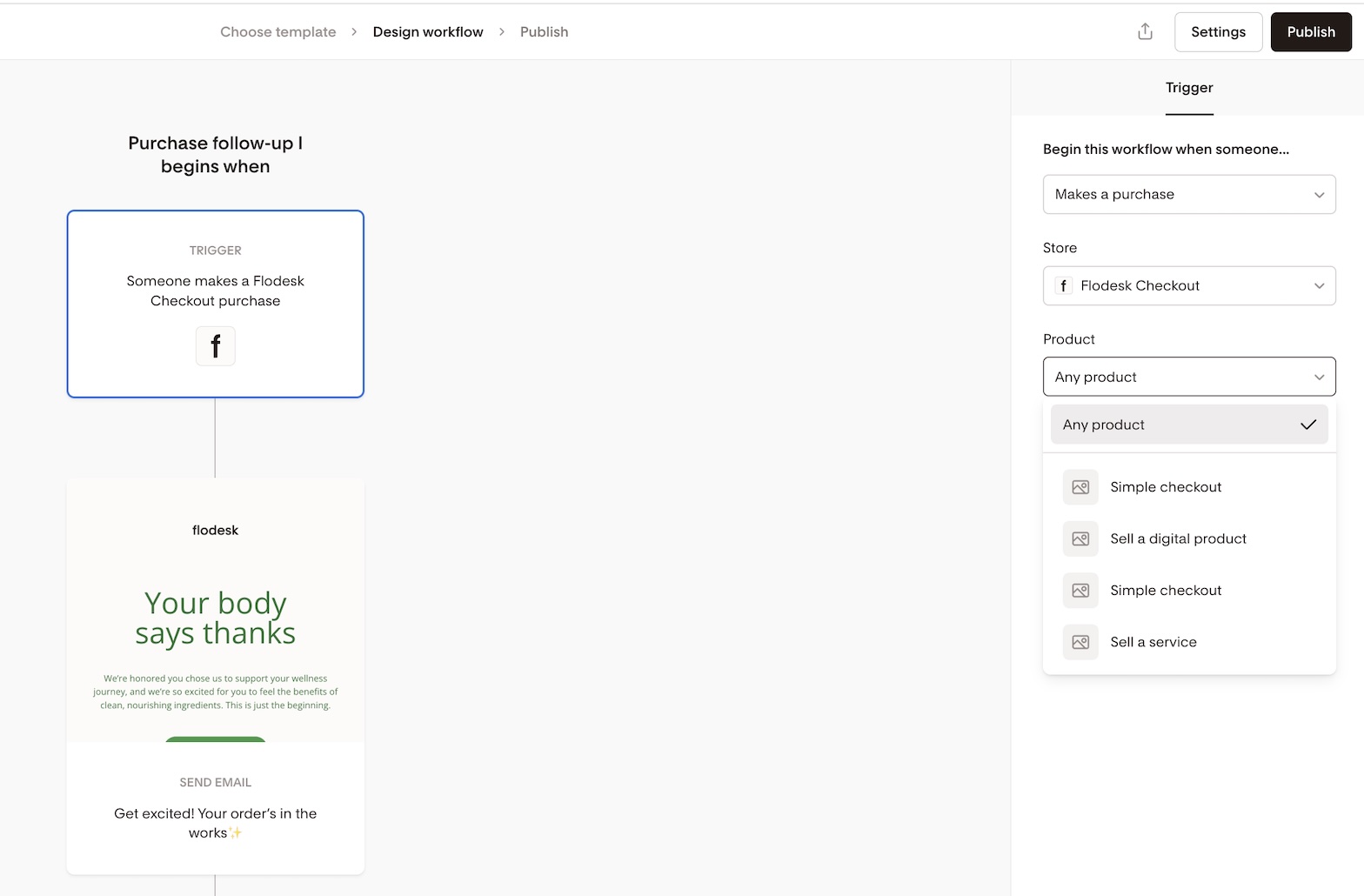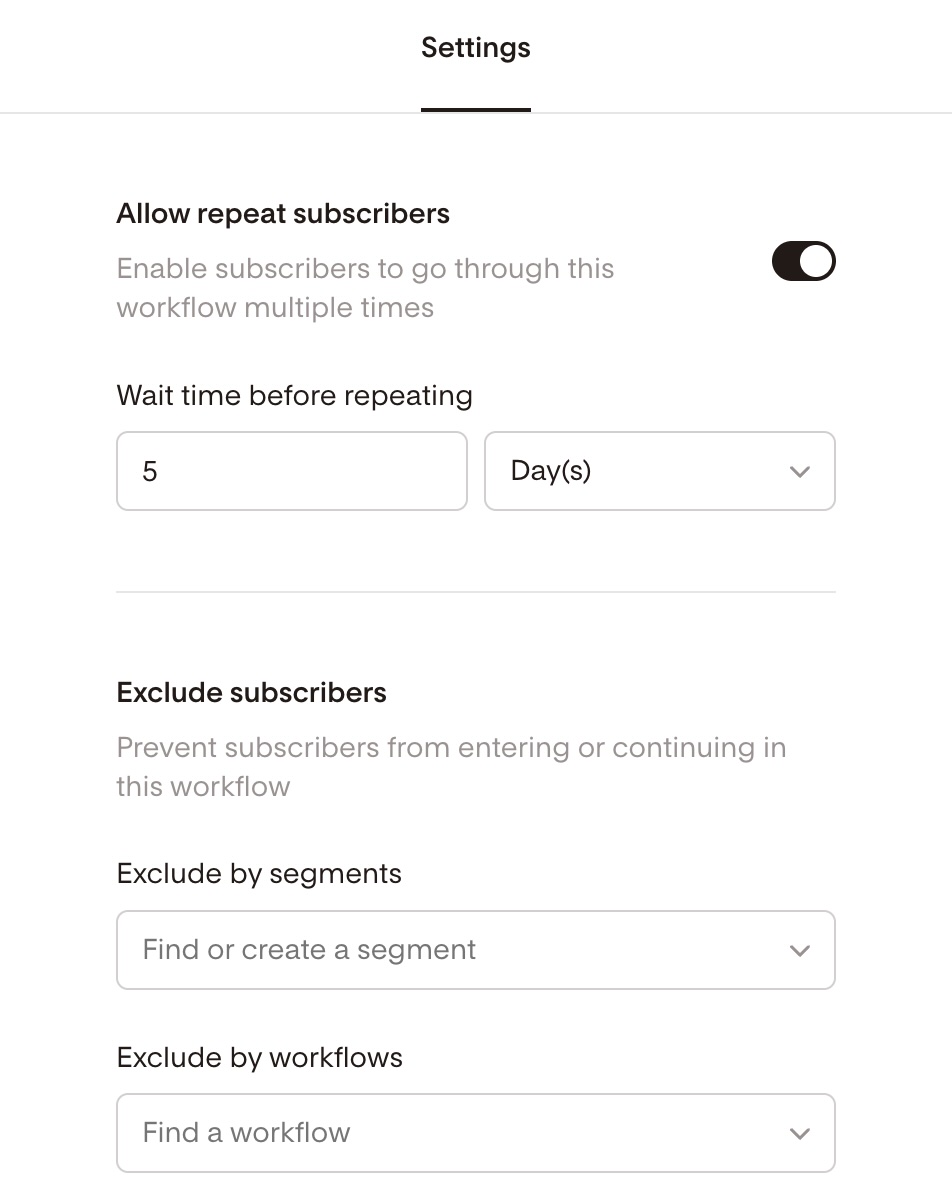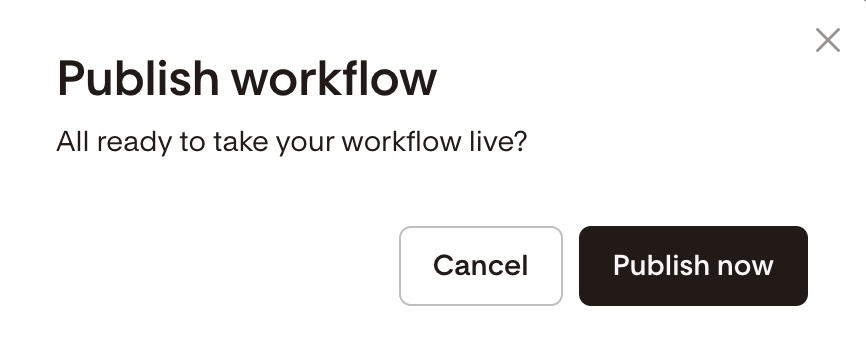How to set up purchase follow-up workflows in Flodesk
Overview
Post-purchase workflows in Flodesk help you automatically follow up with customers after a purchase is completed. These workflows can be used to request reviews, cross-sell products, or build long-term customer relationships.
This article explains how the feature works and how to set it up.
What is a purchase follow-up workflow?
A purchase follow-up workflow is an automated series of emails sent to a customer after they complete an order. These emails are designed to:
Request feedback or reviews
Recommend related products
Encourage repeat purchases
Important: All emails within a post-purchase workflow are standard marketing emails; therefore, only confirmed/active subscribers will receive the emails in these workflows.
How purchase follow-up triggers work in Flodesk
Flodesk currently integrates with Flodesk Checkout, your Shopify, Squarespace or Wix store and ThriveCart to detect completed purchases. When an order is marked as complete:
The workflow is triggered automatically
The customer receives emails based on the sequence you design
Important: Subscribers added to a waitlist for a Flodesk Checkout product will not trigger the workflow. They will only trigger once an actual purchase has been completed.
Steps to create a purchase follow-up workflow
Step 1.
Navigate to Workflows in your Flodesk dashboard and click + New Workflow
Step 2.
Choose Purchase follow-up and select one of the Purchase follow-up workflow templates to customize
Step 3.
Choose a starting trigger: “Makes a purchase” > “On the store"
In the example below, we have selected Flodesk Checkout as the connected store.
Once you select a store from the dropdown, you will have the ability to select whether the workflow is filtered by a specific product that has been purchased or any product.
If you select "Any product", the workflow will trigger any time a purchase is made on the store, regardless of which product(s) are purchased.
If you select a specific product, the workflow will only trigger if the purchase includes the specific product selected from the dropdown.
Important: You can select one single product to filter on. This is not multi-select. Only one product can be selected per workflow.
If the selected product is already being used as the trigger for another published workflow, you will see a notification informing you of this. However, you will not be blocked from publishing the workflow. Note: If you go ahead and publish two post-purchase workflows for the same product, your subscriber will receive both emails from both workflows at the same time.
For Flodesk Checkout, you can select draft, published, or unpublished Checkouts.
For third-party integrations, like Shopify, Squarespace, Wix and ThriveCart, the product lists are sorted alphabetically.
Step 4.
Customize the rest of the workflow based on your needs by adding/editing Time Delays, Emails, Conditions, Actions.
Step 5.
Once you’re ready, click the Settings button in the top right corner to
Enable/disable subscribers to go through this workflow multiple times
Prevent subscribers from entering or continuing in this workflow
Why disable re-entry?
Prevent re-entry when:
You only want to send follow-up once per customer (e.g., as part of a thank-you or welcome strategy).
You offer a one-time use incentive, like a discount or gift that shouldn’t be re-issued for each order.
You want to avoid overwhelming customers with repetitive messages if they order frequently in a short time.
Example: If someone buys three times in a week, they may not need to get three separate sets of follow-up emails.
Additionally, use the "Wait time before repeating" option to control how often subscribers should be able to repeat your purchase follow-up workflow.
Why exclude subscribers from entering the workflow?
Over time, some subscribers may stop engaging with your emails—and continuing to email them can harm your sender reputation. You may want to exclude unengaged subscribers from your workflow, or those in your "Do Not Disturb" segment.
Another common reason to exclude certain subscribers from a workflow is to ensure they don’t receive duplicate or irrelevant communications.
Example: If someone signs up for your membership program, you might add them to a specific segment tied to that membership. Within the membership, you may already have a separate process in place for collecting feedback. In this case, you’d want to exclude those subscribers from entering this workflow—so they’re not asked for reviews in two different ways.
Excluding them helps you maintain a more tailored and professional subscriber experience.
Step 6.
If everything looks as you intended, click Publish > Publish now to take your workflow live.
Use cases and examples
Review Request Email
Sent 5–7 days after purchase completion
Includes product image and link to review page
Cross-sell Workflow
Sent 3–7 days after order
Recommends complementary items based on past purchase
Tips for optimizing your purchase follow-up emails
Use the customer’s name, and if you’ve created a product-specific workflow, the purchased product in the email
Include a clear CTA: “Leave a review,” “Shop related items”
Keep design consistent with your brand
Test timing, subject lines, and discount incentives
FAQs
Can I create more than one post-purchase workflow?
Yes. The post-purchase trigger can be used multiple times for the same store. This means that, for example, you could have 5 post-purchase workflows for your connected store that are unique to 5 different products.
Can I create a post-purchase workflow from scratch or do I have to start with one of the purchase follow-up workflow templates?
Yes. You can start building a post-purchase workflow from scratch. When starting a workflow from scratch, select the “Makes a purchase” trigger from the trigger dropdown menu under the Trigger step, then choose or connect a store.
Build the rest of the workflow according to your needs, by adding Emails, Time Delays, Conditions, Actions.
Do customers need to opt-in to receive post-purchase emails?
Yes. All emails within a post-purchase workflow are standard marketing emails. Only confirmed/active subscribers will receive the emails in these workflows.

